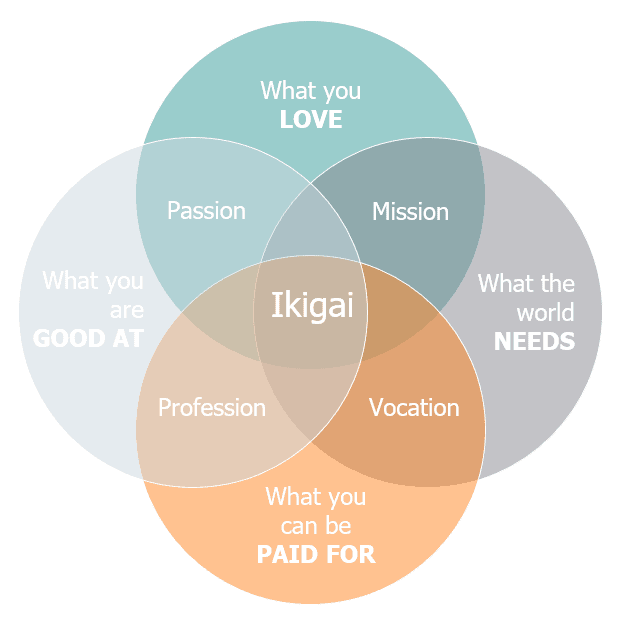
For most people, it takes a lifetime of self-discovery to ‘find yourself’, but have you ever thought about your reason for being – your ikigai? This is often overlooked; we get so caught up in everyday life that we forget about the smaller things. However, tuning in on what gets you out of bed in the morning is vital to your happiness and wellbeing.
Recently we have had more time to appreciate things around us, and many of us were grateful for the extra time to slow down and focus on what matters most to us. To begin, this seemed novel, but the reality is the world keeps moving at this pace even if we don’t. So maybe it’s not the end of the world if we take a moment to pause, breathe and refocus.
What is ikigai?
Ikigai is the Japanese secret to living a long and happy life. It’s your reason for being. We all need an ikigai, and we all have one, but finding it is the hard part.
The concept originates from the island of Okinawa in Japan, where inhabitants have the highest life expectancy in the world. National Geographic reporter, Dan Buettner, identified Okinawa as one of five Blue Zones in the world where people live longer and healthier than average. Dan found nine common denominators between all these places. One being purpose, more specifically, having a sense a purpose. Did you know that allegedly, having a sense of purpose is worth up to seven years of extra life expectancy!
If you’ve found your purpose in life or your ikigai, then we salute you. But there is also no need to worry if you don’t feel like you’ve found yours yet. Much alike unlocking your financial freedom through financial planning, uncovering your purpose in life is a journey, not a race.
For some, your ikigai might be pursuing a hobby or passion. For others, it could be helping people or exploring the world. Whatever it is, ikigai is unique to you.
So where should you start your journey to finding your reason for being?
Firstly, you need to find your passion, mission, vocation, and profession. You should be doing more of what you love, are good at and more of what the world needs. If this also comes with a paycheque then what a bonus.

How to find your reason for being
Go back to basics
Within reason we all follow a prescribed roadmap in life – you go to school, you go to work, and then, you retire. Hopefully, comfortably. We often get wrapped up in everyday life, coupled with concern for the future and often forget to appreciate what we have.
So, it’s best to go back to basics, appreciating the small things and taking time to reflect on where you’ve been, where you are now, and where you’d like to be in the future. Our biggest challenge in life is learning how to live to the fullest and avoid regrets.
Set yourself goals
Setting goals gives you purpose.
We do love to talk about the importance of setting goals, but it is at the very core of what we do. The sole purpose of a financial plan is to create steps that will help bring you closer to an end goal. Even if you haven’t discovered your ikigai, setting goals gives you a focus and will bring a sense of purpose to each day, helping you on your journey to achieving what you want from life.
Use your money wisely
Once you have an idea of where you want to be in life, you should check in on your finances to see if they’re structured in the best way to help you get there, and to see what your current options are.
There’s a misconception that accumulating more money will lead to fulfilment and happiness, but that’s not usually the case. You only really need to acquire enough wealth to do the things you want to do in life. Essentially, you should aim to find a balance.
Money is a tool to help you do the things that make you happy. It should allow you to live a fulfilling life, but a secure one and financial planning certainly helps unlock your financial freedom.
Living well, living long, and living happily
Putting finances aside for a minute, to live a long and healthy life, you must also make sure to look after yourself, as well as looking out for those around you. Especially now, with so much change and uncertainty.
According to the World Health Organisation, one in every four people will be affected by a mental or neurological disorder in their lifetime. And yet, even though mental health concerns are still rising, around two-thirds of people with a mental health concern do not seek help from a professional.
It’s important to talk about how you’re feeling. We all go through highs and lows, and we should be talking about both. After all, we wouldn’t appreciate the good times if there weren’t bumps along the way.
If you’re ever in need of someone to talk to, as we all do from time to time, don’t be afraid to reach out. Here you can find a list of organisations that will be able to offer support and guidance. The Samaritans are also always on hand to listen.
As well as talking about your mental wellbeing, a conversation about your financial wellbeing will also provide greater clarity and direction. So, if you have any questions or would like to discuss your finances or an existing financial plan, then please get in touch with us and speak to one of our financial planners. We’d be happy to help.

